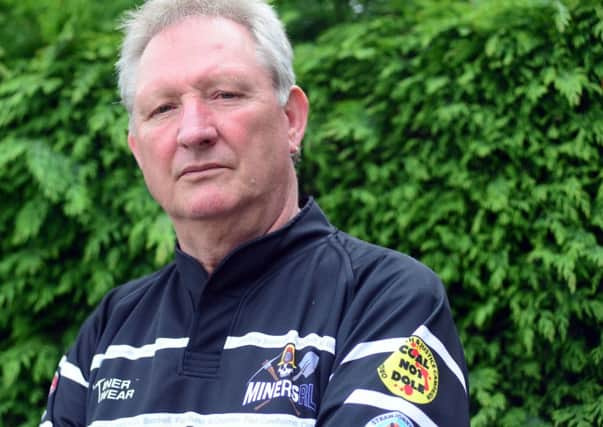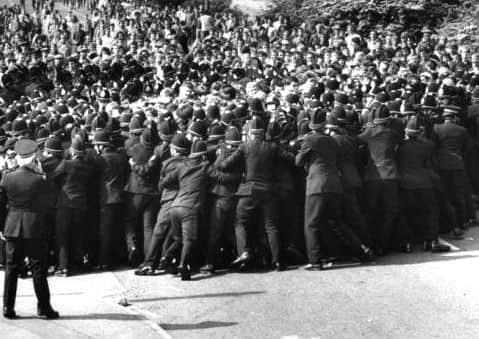Orgreave: Time to heal old wounds


Even though more than 30 years have since elapsed, the date June 18, 1984 remains seared into Kevin Horne’s memory.
“It was red hot,” he says, sitting in the living room of his Mexborough home - the words seemingly transporting him back to that stifling summer’s day in South Yorkshire.
Advertisement
Hide AdAdvertisement
Hide AdKevin was one of the thousands of striking miners who gathered at Orgreave coking plant near Rotherham that day determined to stop several lorry loads of coke leaving for the steelworks. There they were confronted by around 5,000 police officers, many drafted in from across the country, tasked with holding them back.


Tempers boiled over and when mounted police charged the crowd the violence escalated leading to 95 miners being arrested and 50 people injured. Those arrested were held for a variety of alleged offences, with several charged with rioting only for the subsequent trial to collapse after 16 weeks when it became clear that the police evidence was unreliable.
What became known as the Battle of Orgreave marked a watershed not only in the bitter 1984/85 Miners’ Strike, but also in British industrial relations. The Prime Minister Margaret Thatcher had further angered the mining communities by describing men previously thought of as the salt of the earth as the “enemy within.” Attitudes hardened on both sides and talks aimed at ending the dispute broke up in July.
Kevin, who was 36 at the time, vividly remembers that fateful day. “We started going to Orgreave on our way back from other pickets in Nottinghamshire and Derbyshire. There were normally two or three policemen there and half a dozen pickets and it slowly built up through May and into June,” he says.
Advertisement
Hide AdAdvertisement
Hide AdOn the morning of June 18, he and a group of fellow pickets went to their strike centre at the NUM’s offices at Barnburgh and then headed to Orgreave. “We parked up in an estate and walked down past the old spoil tip. We were halfway down when the police came into sight in a field down at the bottom and we stopped and just gasped.


“My mate said to me ‘it’s like an army’ because there were 5,000 police officers marching in blocks. And these weren’t on the frontline they were in reserve, with horses and dogs. It was frightening.”
He says they reached the coke plant only to be turned back by police on horseback and went to join those at the top end of the picket. “That’s where we normally went but on this day for some reason a lot of Yorkshire pickets were at the bottom end.”
He remembers there was a stone wall that had been knocked over and some police officers asked if he would give them a hand moving some of the stones to allow ambulances through to help injured miners. “Naively me and a couple of other lads gave them a hand to clear the road. Unfortunately we cleared the road for the horses and they came through.”
Advertisement
Hide AdAdvertisement
Hide AdKevin was making his way back to the frontline when he was arrested. “When the wagons came I got a shove in the back and pushed into police hands and was loaded into the back of a bus with one or two other pickets. We were slapped about a bit on the bus, but it was nowt special.”
He was initially charged with ‘obstruction’ and taken to Snig Hill Police station in Sheffield. He was placed in a cell with another man where he remained for the next few hours.
“We kept hearing other prisoners coming in and then they put us in this quadrangle because they must have been running out of cells. We walked in and there were people bleeding from the head and some had broken legs, all miners. There was no medical attention, the lads who were there were giving first aid by using T-shirts as bandages.”
After a solicitor arrived the injured were sent to hospital, but Kevin says it wasn’t until midnight that those arrested were taken to the magistrates courts in Rotherham. By this time he says the charges had changed. “It was unlawful assembly for all the pickets at the bottom end and all those at the top were charged with rioting.”
Advertisement
Hide AdAdvertisement
Hide AdDuring this time he hadn’t been able to get word to his family that he was safe. “Nobody knew where I was. My wife phoned my dad, who was a club steward at Rawmarsh, and he had a word with a policeman that came in who made some inquiries and found out that I’d been locked up... It must have been the early hours before I got home.”
The miners then attended a series of bail hearings before their cases went to court. “We were back at work by then,” says Kevin. “I had one rest day a week and went to support the lads in court. My wife used to go most days. She would take the kids to school and then go there. Some of the things that came out in the court were laughable, the police just didn’t seem to have any evidence.”
The case against the miners quickly collapsed after question marks arose over the evidence provided by the police.
Looking back, Kevin believes something changed that day at Orgreave 32 years ago. “There were coaches from south Wales, Scotland and Durham and the police were waving them in. This had never happened before, there were signposts saying ‘this way to Orgreave’. They took us there to give us a good hiding and that’s exactly what they did. They wanted to break the miners.”
Advertisement
Hide AdAdvertisement
Hide AdThe miners weren’t entirely blameless and some say they weren’t slow to retaliate. “It was more about making a nuisance of yourself than trying to injure police officers. If they marched one way we marched the other just to waste their time, almost like a game.”
Kevin continued working as a miner for a few more years following the end of the strike in 1985, before embarking on a 20-year career as an NHS care worker in Doncaster.
But he still feels an affinity with those who worked down the pits. As a supporter of the Orgreave Truth and Justice Campaign he feels there are unanswered questions over the clashes at Orgreave that need addressing and backs the growing number of calls for a new inquiry into exactly happened.
“Generations of police have been taking the flak for what happened 30 years ago. We’ve had Hillsborough and Orgreave and until it’s all bottomed out people can’t move on,” he says.
Advertisement
Hide AdAdvertisement
Hide Ad“We’ve been on about this for a long time, we’ve been to Parliament, and I think there should be a public inquiry so that people believe what we said. We told people what the police did to us and what happened on the picket lines and nobody believed us.
“We’d like justice after all this time and for the full truth to come out. There’s no time limit on justice, we’d like it for our sons and our grandchildren so they have respect again for the bobby on the beat.”
Orgreave: calls for a new inquiry
The Home Secretary Theresa May is facing calls to launch a new inquiry into the events at Orgreave, which saw 95 miners arrested after clashes with police which left 50 people injured.
When the cases came to court they were all abandoned after it became clear that evidence provided by police was unreliable.
Advertisement
Hide AdAdvertisement
Hide AdLast month, Sheffield Hallam MP Nick Clegg backed calls from the Orgreave Truth and Justice Campaign, saying the time was right to investigate the clash between police and miners. Temporary chief constable Dee Collins of West Yorkshire Police is among the latest senior police figures to call for an investigation into the events at Orgreave 32 years ago, saying there remained unanswered questions.